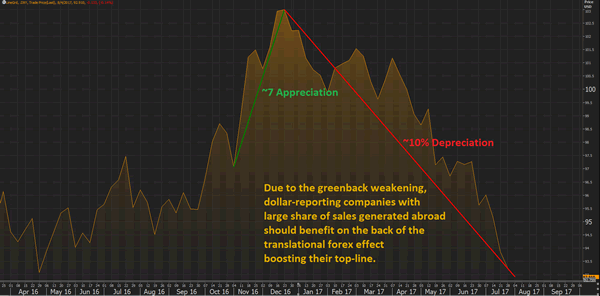US companies with large revenue exposure to exports could get a significant boost to their top-line amid the weakening dollar. At the same time, investors could start losing interest in companies that have a limited international footprint and are mostly focused on the US market as Trump-promised business reforms and fiscal stimulus get delayed. The percentage of S&P 500 companies’ sales from foreign countries was 43% in 2016, with the energy and technology services sectors topping the list.
The US dollar fell following last week’s failed attempt to pass the "skinny repeal" of Obamacare in Senate, when all the Democrat and three Republican Senators voted against it. The collapse of the repeal of the Affordable Care Act raises questions about the Trump administration’s ability to pass through major legislation and casts doubts whether the promised tax reforms will be realized. In addition, the recent shake-up of key White House staff members along with political controversies and investigations surrounding Trump’s family and close aids, adds to the uncertainty over the US political outlook.
The current economic and geopolitical events are a headwind for the greenback, suggesting further depreciation of the US currency is possible. However, even if the dollar stays where it is now, the forex translationtailwind will be stronger in the second half of the year, especially in the fourth quarter, due to the dollar surge last year following the US presidential elections.

Europe accounts for the largest share of revenues that S&P 500 companies generate abroad, standing at 7.8% in 2016. The recent euro/dollar appreciation will be especially beneficial to the companies with large exposure to the eurozone as revenues generated there will be higher when translated to dollars. Apple, Exxon, GE, Walgreens and J&J have the highest exposure to the region, among the S&P 500 companies that disclose revenues from Europe.
Among sectors with the largest foreign footprint, energy at 57.9% and information technology at 57.8% top the list, according to the S&P Dow Jones Indices 2016 report.
Trump’s November election victory induced a stock market rally as both investors and chief executives expected promised tax reform to unleash corporate profits. President Trump proposed to reduce the maximum corporate profit tax rate from 35% to 15% as a key element of his reform. However, recent political developments have brought into question the feasibility of this change. Initially, it was thought that the highest tax-payers in the S&P 500 that generate all of their revenues domestically would benefit the most. The share price of companies such as Anthem (up 18%), AutoNation (25%), Humana (up 31%) and Nordstrom (22%) rallied post November 8, 2016, as these companies had one of the highest five-year average tax-rates among S&P 500 members. Current political woes signal that tax reform should not be expected in the near term. In addition, due to little or no foreign exposure these companies will not benefit from the forextranslationeffect.
Furthermore, a delay in passing through promised tax reforms is already hurting the US economy with around 55% of CFOs, surveyed by Taxand, postponing their investment decisions and locking up the capital that could have been circulating and lifting economic activity.
US companies that are heavily domestic dependent and reliant on tourists such as luxury goods and travel service companies, could finally start seeing a lift in their domestic revenues as visitors return to spend in the US. This could cushion some of the translationopportunity these companies will miss due to little or no international footprint. Luxury goods companies such as Coach, Tiffany and Ralph Lauren had their domestic sales hammered during the past year as tourists- especially Chinese- decided to spend elsewhere. With the yuan strengthening against the dollar, these companies could boost revenues if mainland travelers spend in the US.
In case tax reform does go through, the chances of this happening in 2017 are small, considering the complexity of the matter and the time it took to discuss the healthcare bill, which failed to see day-light at the end. At the same time, the dollar is weakening and consequently awarding companies that were considered losers after Trump’s win in November.
